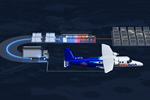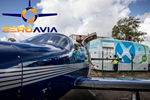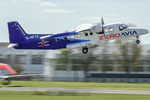Federal grant awarded to ZeroAvia for electric propulsion system advancement
ZeroAvia has been awarded $4.2 million in U.S. federal funding to support its work in developing its electric propulsion system designed for 2-5 megawatt powertrain applications.
ZeroAvia (Hollister, Calif., U.S.) announces that it has been awarded $4.2 million in U.S. federal funding through the Federal Aviation Administration’s (FAA) Fueling Aviation’s Sustainable Transition discretionary grant program for Low-Emission Aviation Technology (FAST Tech). The grant supports ZeroAvia’s work to further develop and validate its electric propulsion system designed for 2-5 megawatt powertrain applications.
The R&D work will take place in ZeroAvia’s Everett, Washington, propulsion center of excellence to advance the design, fabrication and testing of its proprietary electric motor and inverter toward eventual certification and commercial deployment.
The work is building on ZeroAvia’s HyperCore stackable motor, previously ground-tested at the Everett facility, as well as its silicon-carbide inverters. It complements other ZeroAvia R&D projects in the U.K. focused on high-temperature PEM (HTPEM) fuel cells to unlock hydrogen-electric engines for 40-80-seat aircraft.
ZeroAvia has a background in propulsion technologies development, particularly hydrogen-electric, whether through hydrogen storage and refueling or components like fuel cells and inverters. Earlier in 2024, ZeroAvia and Verne (San Francisco, Calif., U.S.) signed a memorandum of understanding (MOU) to jointly evaluate the opportunities for using cryo-compressed hydrogen (CcH2) onboard aircraft and for conducting CcH2 refueling from gaseous hydrogen (GH2) and liquid hydrogen (LH2) sources. Verne is known for its development and demonstration of Type III composite versions of these storage systems.
“The FAA is investing in hydrogen and electric propulsion as part of the future for aviation, and our technology is well-positioned to help advance this critical pathway. ZeroAvia appreciates the agency’s recognition of our ability to conduct this important research and development work on electric propulsion systems,” says Val Miftakhov, founder and CEO of ZeroAvia. “This award demonstrates the value of the 2022 Inflation Reduction Act in decarbonizing aviation and complements the hydrogen-forward provisions in the recent FAA Reauthorization, both of which are strong indications that U.S. leadership shares our vision of a clean future of flight.”
Related Content
-
Next-generation airship design enabled by modern composites
LTA Research’s proof-of-concept Pathfinder 1 modernizes a fully rigid airship design with a largely carbon fiber composite frame. R&D has already begun on higher volume, more automated manufacturing for the future.
-
Plant tour: Spirit AeroSystems, Belfast, Northern Ireland, U.K.
Purpose-built facility employs resin transfer infusion (RTI) and assembly technology to manufacture today’s composite A220 wings, and prepares for future new programs and production ramp-ups.
-
Plant tour: Middle River Aerostructure Systems, Baltimore, Md., U.S.
The historic Martin Aircraft factory is advancing digitized automation for more sustainable production of composite aerostructures.
















